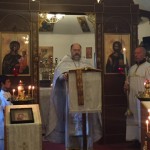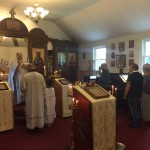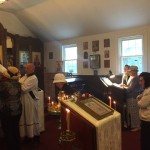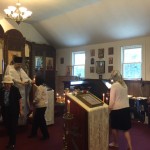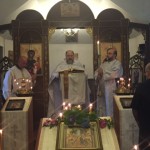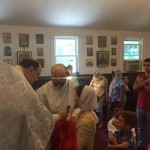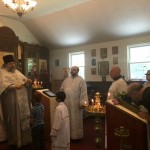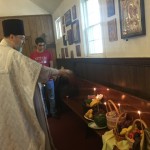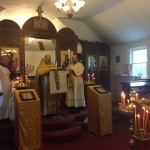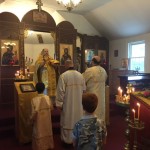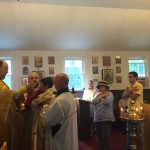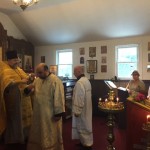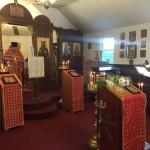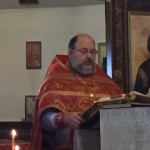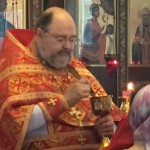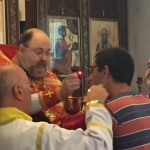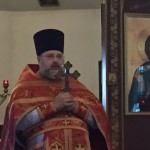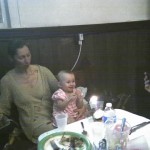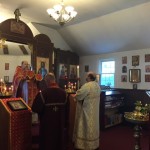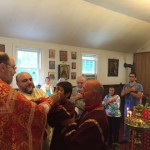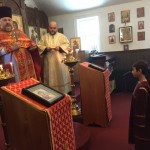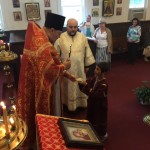On August 9, on the 10th Sunday after Pentecost and on the feast of the Holy Great-Martyr Panteleimon, we had a nice liturgical celebration in our church. The Rector, Archpriest Igor Tarasov served the Divine Liturgy. Following the Scripture readings he preached a homily in Russian. An English version of that homily is as follows:
“Today’s lesson from the Gospel is about casting out the demon. It is again about faith. We spoke about faith last time. Today we may be convinced again how faith is important.”
”The child possessed by a demon described in today’s Gospel was tormented in different ways. Sometimes he would fall into the fire, at other times he would fall into the water (Mt. 17, 15). In other words the demon, who lived inside the son, was trying to destroy him by burning him to death or drowning him, in order to occupy that soul to all eternity.”
“The falling into fire and water also show us how the demons abuse God’s creation. Fire is not a tool with which to burn and destroy, but a gift of God for heating, cooking and other useful activities. Water is not a tool with which to drown, but a gift of God for drinking and washing and other useful activities. Moreover, we can see how fire is also a symbol of the fire of passion and anger which can possess those who are attacked by demons, and water is a symbol of the waves of melancholy which can also possess those who are attacked by demons.”
”We may wonder how did the demon get inside the man’s son and possess him? To this question we have the reply of Christ: “O faithless and perverse generation” (Mt. 17, 17). The demon came into possession of the son through unbelief, faithlessness. Not only the son’s unbelief, but also the unbelief of the father and others around the son who could have cared for him and given him faith. However, as with everything that God allows to happen, there is a positive, providential aspect to this illness. It is clear that because of the illness of the son, the father has been brought to know humility. Thus he calls Christ, “Lord” and asks, “Have mercy on my son” (Mt. 15, 17). This shows humility, not pride. God gives His grace to the humble ones. Thus the possessed son of the humble father was healed.”
”Understanding that, we may still ask: What is the solution to the sickness of the son? The answer is “prayer and fasting”, for this is how Christ casts the demon out of the son (Mt. 17, 21). Prayer and fasting are the deepening of faith. The Fathers of the Church call prayer and fasting a “two-edged sword”.”
“Prayer and fasting are the most important actions of faith. If we do them, we show our faith. And we know that faith is able to work great miracles. Today we celebrate feast of the Holy Great-Martyr and Healer Panteleimon. He performed many miracles during his life. His first miracle was made even before he we became a Christian. St. Panteleimon believed in Christ but was not yet baptized when he encountered a child who was bitten by a snake. The child was dead or dying. St. Panteleimon began to pray fervently to Jesus Christ. And a miraculous thing occurred: the child became healed and the snake exploded into pieces. See, how great things the Lord accomplishes if we believe and pray!
In other words, where there is prayer and fasting, there is faith. And as St. Theophan the Recluse wrote: “Where there is no prayer and fasting, there are the demons”.”
“Referring to the word of St Theophan, we could say therefore that much of the modern world has become the dwelling-place of demons. It seems that each day that passes brings us news of some new instability, some new disaster and misfortune.”
“The fact is that, whenever we are faithless and cease to pray and to fast, then we lose the protection of the grace of God and we are besieged by demons and the world falls into fire or water. For instance, sometimes we can hear that terrible crimes happen in small towns. These are the places where nothing could ever happen. In Russia before the Revolution people said the same thing, but holy men like St Theophan the Recluse, St. Ignatius Brianchaninov, St John of Kronstadt and many others, all correctly prophesied that if people did not return to faithfulness, to prayer and fasting, then a great disaster would befall them. And so it happened and Russia became the favorite resort of the demons: “Where there is no prayer and fasting, there are the demons”.”
“Dear brothers and sisters! As today’s Gospel has made clear, you need prayer and fasting, thus you need faith. It is all a question of faith. Let us then be faithful.”
Following the Liturgy dismissal the Rector congratulated the Malyshew family on the occasion of the first-year birthday of Yelena Malyshew. Little 1-year old Yelena is our youngest parishioner who was borought to the church almost every Sunday and all this time participated in our Eucharistic life receiving Holy Communion. Traditional Polychronion (“Mnogaia leta”) was sung.
After the services our celebration continued at the trapeza table. A toast to little Yelena was made and a cupcake with a candle presented along with the singing of “Happy Birthday”. The Rector and parishioners enjoyed delicious meals and a nice company.

